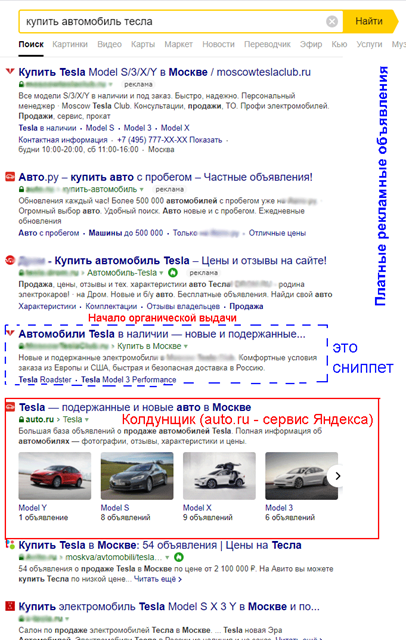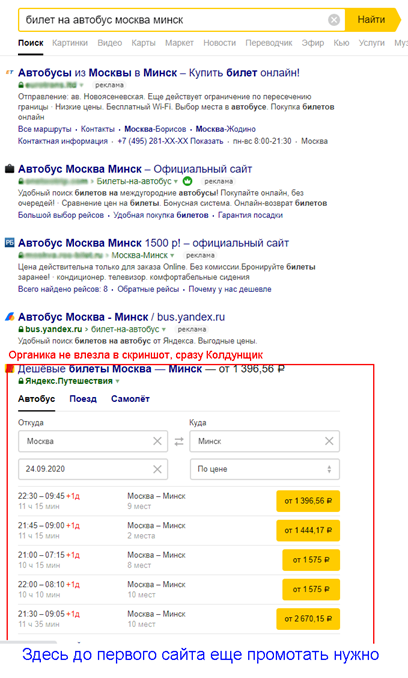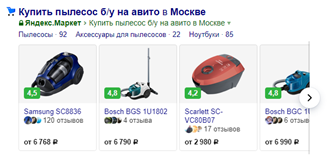And that he, using the trust of his own audience, misleads users and offers not the most relevant sites, but his services. And this deprives market players of a noticeable share of profits, which fetters and sometimes stops the development of these online services and, in general, the industry.
We figure out if this is so. Write in the comments if you agree with this opinion.

Let's define the terms. A snippet is a small piece of text that is shown to the user in search results. Its purpose is to give the user the opportunity to choose which site to go to. The more users saw your snippet in the search results, the more chance they will get to your site.

CTR (Click to Rate) - snippet parameter - the percentage of people moving from the search results in relation to the total number of people who searched for something in a search engine for this phrase.
According to research (links at the end of the article) - the lower the snippet is in the search results, the less people click on it. Those. The CTR of the snippet decreases if the site is shown below in the search results.
CTR depends on the search query, on the topic, on the appearance of the snippet itself, etc. The specific value is not so important, then, for simplicity, let's take the CTR = 20% for the first place in the organic search results. The snippet of second place will be approximately 15%, in third place 10-12%, etc. decreases with increasing space.
If you are the best site in the industry and ranked # 1 for relevant queries, then you could expect to get 20% traffic (CTR = 20%). Usually, in the first places in the organic search results, Yandex shows sites that have confirmed good user satisfaction. Each search engine has a system of metrics that assess not only the relevance of search results (i.e., how much the sites from the search results match the user's request), but also how satisfied users who went to each specific site are satisfied with the sites found - this is the basis of modern search.
What happens when a block 2-3 snippets in height appears between contextual advertising (Yandex.Direct) and organic search results. Is there one of Yandex services in this block? That's right - the CTR of the first places in organic search results is going down. If only because, instead of the first or second screen, the snippet “leaves” for the second or third screen (for smartphone screens, this effect is even more pronounced).

Instead of the previous 20% of traffic, the industry leader now gets 10-12%. Those who previously received 10% will now receive 5%, etc.
Let the site have 100 thousand visitors a day. Further, a simple calculation: if an Internet company receives half of the traffic from SEO (50 thousand), and half of it is Yandex (25 thousand), then after the block with the Yandex service (the so-called sorcerers) appears, these 25 thousand will remain only 12 thousand. It may seem insignificant, but what is 12 out of 100? This is 12% of traffic and means 12% of revenue. Here you can count a penny for a long time, talk about fixed and variable costs, about the features of this or that business. This is not the point. The given example of calculation is made on the basis of real business experience, based on real indicators, the numbers are very close to the real ones. This is life now.
Imagine that the margin of your business was 10% -15% and 12% of your profit “evaporates”? How much resources can you now spend on audience research, testing new technologies, and developing the product itself?
There would be no reason to worry if Yandex services were ranked in the general order and all market participants could participate on an equal footing - show the same bright and attractive super-snippets with pictures, tables, etc. Such an opportunity “as it were” existed for a short time - a technology presented by Ilya Segalovich - Yandex.Ostrova (in fact - "sorcerers"). However, without leaving beta testing, it was phased out. The official reason is that the Webmaster Islands are worse in quality than Yandex's own Islands. Now "sorcerers" are available only to online services affiliated with Yandex. Here are a few more examples of sorcerers, you must admit that you won't miss such a snippet, it's difficult to pass by:

Or like this:

More:

Although even in this case, no one, except for Yandex developers, will ever know which multiplying coefficient (or other mechanism of artificially increasing relevance) is applied by Yandex to its own services in order to get more traffic.
Now Yandex is no longer just a search engine. This is an IT company that is building its empire. But does it do it honestly, or at the expense of other players, and is it misleading users by manipulating organic search results? Is the development of the industry slowing down due to manipulation, and what will we get in 3-5-10 years?
It turns out that the mega-corporation "feeds" users only with its own products, because other companies "could not stand the competition"? But the lack of competition leads to the fact that end users suffer.
Interesting on the topic:
- An overview of various studies of CTR snippets.
- Article from Yandex (old, but the essence does not change).
- Research using EyeTracking technology (this time about Google).